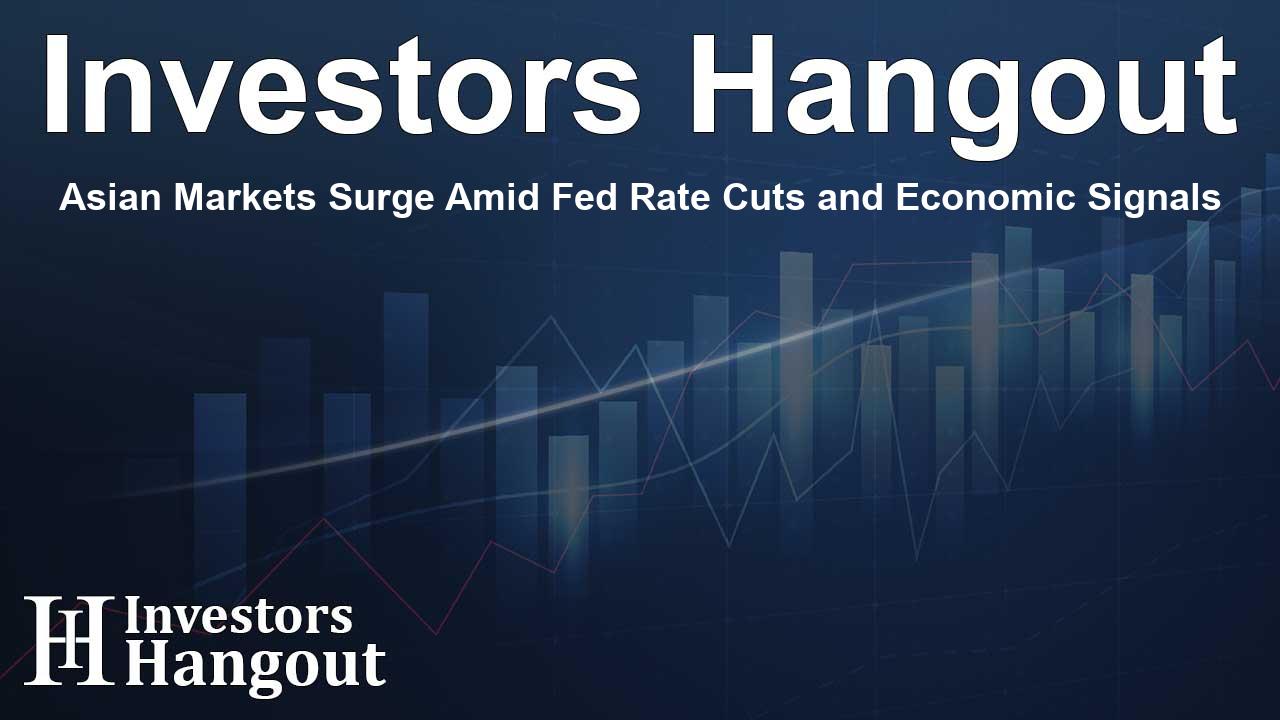Asian Markets Surge Amid Fed Rate Cuts and Economic Signals

Asian Markets Respond Optimistically to Rate Cuts
On a recent Thursday, Asian markets showed a positive trend following the Federal Reserve's proactive measures to ease the economic climate by implementing a significant cut to interest rates. This strategic decision aims to prevent a recession across the U.S., significantly impacting both local and global markets.
Key Index Movements Across Asia
Among the leading indexes, the Nikkei 225 in Tokyo surged by 2.5%, reaching 37,284.43 points. Meanwhile, Hong Kong's Hang Seng increased by 1% to settle at 17,840.93 points, indicating a robust recovery in market confidence. The Shanghai Composite index also climbed 0.8% to 2,738.19 points, and Taiwan's Taiex experienced a 1% uplift, reflecting heightened investor enthusiasm.
Understanding the Federal Reserve's Influence
Conversely, South Korea's index faced a slight decline, dropping 0.3% to 2,566.65 points. The divergence in performance among these markets underscores the varying reactions to U.S. monetary policy shifts. The Federal Reserve’s recent significant move is viewed as a critical factor encouraging financial market stability, despite Wall Street showing a rather muted response to the rate cut.
The Fed's Monetary Policy Context
The recent cut in the federal funds rate was the first significant reduction in over four years. It marked the end of a lengthy phase where rates were maintained at historically high levels in an effort to curb inflation, which had reached alarming heights. This cut is intended not only to stimulate growth but also addresses the pressing job market and broader economic concerns.
Reactions from Economic Experts
Economic analysts have noted that the Fed's proactive stance is crucial in adjusting to the changing economic landscape. Thomas Mathews from Capital Economics remarked that the market responses may be limited, indicating that future rate cuts might not yield significant reactions as well.
Impact on Financial Markets
The Federal Reserve's move is anticipated to have two major positive effects on financial markets. First, it helps relieve pressure from an economy that has been experiencing a slowdown due to elevated rates. Secondly, this action tends to drive up investment prices across various sectors, benefiting not just stock markets but also commodities like gold.
Investor Sentiments and Market Predictions
As inflation appears to have eased considerably since its peak, attention is now shifting towards maintaining balance in the labor market, as noted by Fed Chair Jerome Powell. His emphasis on supporting employment during prosperous times highlights the Federal Reserve's commitment to proactive management rather than reactive measures based on layoffs.
Wall Street's Performance
Amid these discussions, Wall Street has seen varied performances in key indexes. The S&P 500 declined by 0.3%, closing at 5,618.26 points, while the Dow Jones Industrial Average and the Nasdaq experienced slight dips as well. This illustrates the cautious optimism among investors as they gauge the implications of the Federal Reserve's monetary policy.
Key Developments in U.S. Markets
In terms of individual stocks, notable movements included Intuitive Machines, which soared by 38.3% following NASA’s significant contract award related to lunar exploration. Conversely, shares of Tupperware Brands have faced challenges, leading to halted trading after the company's Chapter 11 bankruptcy filing.
Oil and Currency Movements
In commodity markets, U.S. benchmark crude oil prices fell slightly, while international benchmark Brent crude also faced a marginal decline. Furthermore, the dollar experienced strength against the Japanese yen but slipped slightly against the euro, indicating a complex reaction to recent economic developments.
Final Thoughts on Economic Trends
Overall, the recent Federal Reserve decisions and the subsequent movements across Asian markets reflect a nuanced shift in global economic sentiment. As sectors react dynamically to changes in monetary policy, investors remain vigilant, looking for opportunities in the evolving landscape.
Frequently Asked Questions
What recent changes did the Federal Reserve make?
The Federal Reserve cut interest rates as a proactive measure to support the economy and address potential recession risks.
How did Asian markets respond to these changes?
Asian markets, including the Nikkei 225 and Hong Kong's Hang Seng, saw significant gains following the announcement of the rate cuts.
What is the overall economic outlook according to analysts?
Analysts express cautious optimism, noting that while the Fed's actions are supportive, market reactions have been muted.
How might these changes impact investors?
Reduced interest rates typically lead to increased investment prices, benefiting various asset classes and potentially providing more investment opportunities.
What critiques does the Federal Reserve face regarding its policies?
Some critics argue that the Fed may have kept rates too high for too long, but the chair asserts that current measures are timely and necessary.
About Investors Hangout
Investors Hangout is a leading online stock forum for financial discussion and learning, offering a wide range of free tools and resources. It draws in traders of all levels, who exchange market knowledge, investigate trading tactics, and keep an eye on industry developments in real time. Featuring financial articles, stock message boards, quotes, charts, company profiles, and live news updates. Through cooperative learning and a wealth of informational resources, it helps users from novices creating their first portfolios to experts honing their techniques. Join Investors Hangout today: https://investorshangout.com/
Disclaimer: The content of this article is solely for general informational purposes only; it does not represent legal, financial, or investment advice. Investors Hangout does not offer financial advice; the author is not a licensed financial advisor. Consult a qualified advisor before making any financial or investment decisions based on this article. The author's interpretation of publicly available data shapes the opinions presented here; as a result, they should not be taken as advice to purchase, sell, or hold any securities mentioned or any other investments. The author does not guarantee the accuracy, completeness, or timeliness of any material, providing it "as is." Information and market conditions may change; past performance is not indicative of future outcomes. If any of the material offered here is inaccurate, please contact us for corrections.